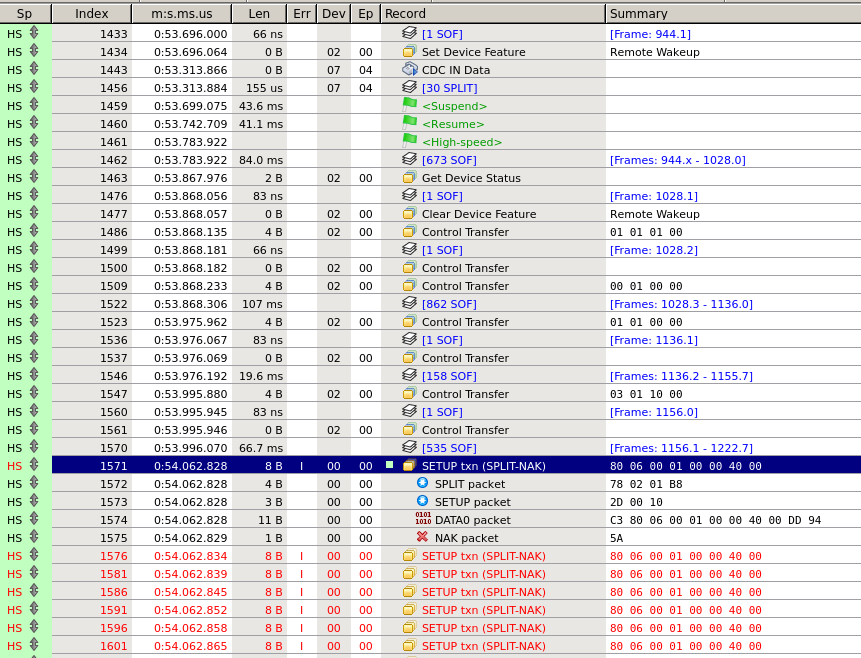Sitara Family and Friends,
One of our good friends has seen an interesting phenomenon with the AM3352 Sitara USB controller. Looking to see if any has witnessed this before also and/or any comments or input one may have.
-----
We have one of the 2 ports of the AM335x configured in HOST mode and connected to a USB2412 HUB (full-speed) from Microchip.
On one of the HUB ports, we have a Bluetooth dongle from Bluegiga (full speed device).
We have several products installed in the field where the customer is complaining of problems with the BT dongle.
In our office, we can reproduce a problem similar to what the customer describes by forcing a software reset of the BT dongle (special command of BlueGiga API).
The device would disconnect from the USB bus and reconnect. It takes usually 6-7 SW reset to make the HOST/HUB connection crash.
The problem seems to be at the “Get descriptor” frame (a split frame) as showed below (line 1571):
The kernel log looks as follows:
[ 329.492575] usb 2-1.1: USB disconnect, device number 3
[ 338.491957] usb 2-1.1: new full-speed USB device number 4 using musb-hdrc
[ 338.602454] usb 2-1.1: New USB device found, idVendor=2458, idProduct=0001
[ 338.609488] usb 2-1.1: New USB device strings: Mfr=1, Product=2, SerialNumber=3
[ 338.618623] usb 2-1.1: Product: Low Energy Dongle
[ 338.624371] usb 2-1.1: Manufacturer: Bluegiga
[ 338.629662] usb 2-1.1: SerialNumber: 1
[ 338.768849] cdc_acm 2-1.1:1.0: ttyACM0: USB ACM device
[ 338.783345] usbcore: registered new interface driver cdc_acm
[ 338.801037] cdc_acm: USB Abstract Control Model driver for USB modems and ISDN adapters
[ 381.420616] usb 2-1.1: USB disconnect, device number 4
[ 381.600196] musb-hdrc musb-hdrc.1: Babble
[ 381.908013] usb 2-1: reset high-speed USB device number 2 using musb-hdrc
[ 382.160175] usb 2-1: USB disconnect, device number 2
[ 382.439959] usb 2-1: new high-speed USB device number 5 using musb-hdrc
[ 382.584265] usb 2-1: New USB device found, idVendor=0424, idProduct=2412
[ 382.591064] usb 2-1: New USB device strings: Mfr=0, Product=0, SerialNumber=0
[ 382.608613] hub 2-1:1.0: USB hub found
[ 382.616016] hub 2-1:1.0: 2 ports detected
[ 383.367959] usb 2-1.1: new full-speed USB device number 6 using musb-hdrc
[ 383.478322] usb 2-1.1: New USB device found, idVendor=2458, idProduct=0001
[ 383.485355] usb 2-1.1: New USB device strings: Mfr=1, Product=2, SerialNumber=3
[ 383.495276] usb 2-1.1: Product: Low Energy Dongle
[ 383.502293] usb 2-1.1: Manufacturer: Bluegiga
[ 383.508047] usb 2-1.1: SerialNumber: 1
[ 383.521580] cdc_acm 2-1.1:1.0: ttyACM0: USB ACM device
[ 391.736523] usb 2-1.1: USB disconnect, device number 6
[ 392.363957] usb 2-1.1: new full-speed USB device number 7 using musb-hdrc
[ 392.474088] usb 2-1.1: New USB device found, idVendor=2458, idProduct=0001
[ 392.481122] usb 2-1.1: New USB device strings: Mfr=1, Product=2, SerialNumber=3
[ 392.490127] usb 2-1.1: Product: Low Energy Dongle
[ 392.495852] usb 2-1.1: Manufacturer: Bluegiga
[ 392.501087] usb 2-1.1: SerialNumber: 1
[ 392.513977] cdc_acm 2-1.1:1.0: ttyACM0: USB ACM device
[ 403.292595] usb 2-1.1: USB disconnect, device number 7
[ 403.915957] usb 2-1.1: new full-speed USB device number 8 using musb-hdrc
[ 404.026187] usb 2-1.1: New USB device found, idVendor=2458, idProduct=0001
[ 404.033220] usb 2-1.1: New USB device strings: Mfr=1, Product=2, SerialNumber=3
[ 404.042066] usb 2-1.1: Product: Low Energy Dongle
[ 404.047807] usb 2-1.1: Manufacturer: Bluegiga
[ 404.052280] usb 2-1.1: SerialNumber: 1
[ 404.065860] cdc_acm 2-1.1:1.0: ttyACM0: USB ACM device
[ 414.588619] usb 2-1.1: USB disconnect, device number 8
[ 415.231960] usb 2-1.1: new full-speed USB device number 9 using musb-hdrc
[ 415.342288] usb 2-1.1: New USB device found, idVendor=2458, idProduct=0001
[ 415.349322] usb 2-1.1: New USB device strings: Mfr=1, Product=2, SerialNumber=3
[ 415.358152] usb 2-1.1: Product: Low Energy Dongle
[ 415.363839] usb 2-1.1: Manufacturer: Bluegiga
[ 415.369049] usb 2-1.1: SerialNumber: 1
[ 415.381877] cdc_acm 2-1.1:1.0: ttyACM0: USB ACM device
[ 422.832516] usb 2-1.1: USB disconnect, device number 9
[ 423.491958] usb 2-1.1: new full-speed USB device number 10 using musb-hdrc
[ 428.664989] usb 2-1.1: device descriptor read/64, error -110
[ 444.279954] usb 2-1.1: device descriptor read/64, error -110
[ 444.471957] usb 2-1.1: new full-speed USB device number 11 using musb-hdrc
[ 449.655955] usb 2-1.1: device descriptor read/64, error -110
[ 465.271954] usb 2-1.1: device descriptor read/64, error -110
[ 465.463956] usb 2-1.1: new full-speed USB device number 12 using musb-hdrc
[ 476.151961] usb 2-1.1: device not accepting address 12, error -110
[ 476.235958] usb 2-1.1: new full-speed USB device number 13 using musb-hdrc
[ 486.903951] usb 2-1.1: device not accepting address 13, error -110
[ 486.910338] usb 2-1-port1: unable to enumerate USB device
Finally, we can interestingly reproduce this problem with a Beaglebone Black, an EVB-USB2422 development board and a BLED112 dongle;
BeagleBoard.org Debian Image 2017-03-19
Linux beaglebone 4.9.41 #24 SMP PREEMPT Fri Sep 29 15:36:47 EDT 2017 armv7l GNU/Linux
Kernel from https://github.com/beagleboard/linux
We were not able to reproduce this problem with another host CPU and this HUB from Microchip; hence the main reason why we are asking for feedback.
-----
I'd appreciate any comments.
TY,
CY



